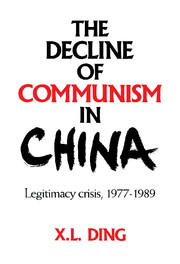1 - Theoretical and comparative issues
Published online by Cambridge University Press: 17 September 2009
Summary
The major theoretical arguments made in this work can be summarized as follows: First, the mainstream theories of political stability often define what is an elite too narrowly. They usually focus attention on only a small number of national political leaders. In the case of communist studies, for example, the main focus is on the Politburo or the party central committee level, and other levels and types of elites in society are often neglected. I advocate widening the scope of what gets considered as elite in the studies of the transition from communism, to include not only party-state leaders but also a group I call the counterelite, consisting of intellectuals and professionals who were, for the most part, opposed to the communist ruling elite.
The second flaw in the mainstream theories of political stability is that they stress only one aspect of the function of legitimation – to keep a regime surviving. This one-dimensional view justifies the approach in which the researcher pays heed mainly to the process of self-legitimation and solidification among a few power centers. Against this, I advocate a multifunctional view of regime legitimation: The function or purpose of regime legitimation should be understood both negatively – keeping power or securing political survival, and positively – using power or achieving socioeconomic objectives.
- Type
- Chapter
- Information
- The Decline of Communism in ChinaLegitimacy Crisis, 1977–1989, pp. 9 - 35Publisher: Cambridge University PressPrint publication year: 1994



